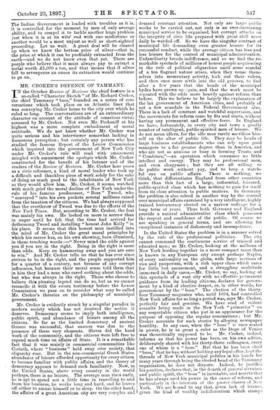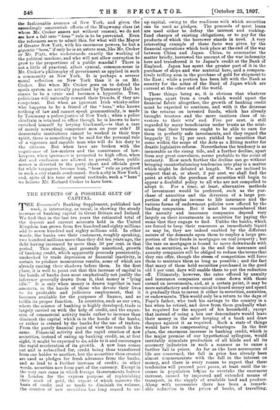MR. CROKER'S DEFENCE OF TAMMANY.
TN the October Review of Reviews the chief feature is a so-called "Character Sketch" of Mr. Richard Croker, the chief Tammany "boss," founded on a series of con- versations which took place on an Atlantic liner that was conveying Mr. Croker home to the city over which he ruled so long. The conversations are of an extraordinary character on account of the attitude of conscious virtue assumed by Mr. Croker. Not even Mr. Pecksniff at his highest was a more complete embodiment of moral rectitude. We do not know whether Mr. Croker was quite serious and his interviewer somewhat lacking in humorous perception ; but certainly any person who has studied the famous Report of the Lexow Commission which inquired into the government of New York City under Mr. Croker's rule will read with amazement mingled with amusement the apologia which Mr. Croker constructed for the benefit of his listener and of the readers of the Review of Reviews. Mr. Croker here poses as a civic reformer, a kind of moral leader who took up a, difficult and thankless piece of work solely for the sake of doing as much good to the inhabitants of New York as they would allow him. Mr. Croker, it seems, watched with much grief the moral decline of New York under the rule of his famous predecessor, " Boss " Tweed, who "conveyed" into his own pockets several millions raised from the taxation of the citizens. We had always supposed that the overthrow of Tweed was due to the efforts of the New York Times. But, according to Mr. Croker, the feat was mainly his own. He looked on more in sorrow than in anger until he felt that the time had arrived for dethroning Tweed and installing "honest John Kelly" in his place. It seems that this honest man instilled into the mind of Mr. Croker the great moral principles by which his career has, on his own showing, been illumined, in these touching words :—" Never mind the odds against you if you are in the right. Being in the right is more than odds. Keep on hammering away and you are sure to win." And Mr. Croker tells us that he has ever since striven to be in the right, and the people supported him for a quarter of a century, not because of any corrupt influences, but because their moral sense told them that in him they had a man who cared nothing about the odds, but who was always in the right. Those who choose to believe this pleasing legend can do so, but as we cannot reconcile it with the sworn testimony before the Lexow Commission we pass on to consider what may be called Mr. Croker's theories on the philosophy of municipal government.
Mr. Croker is evidently struck by a singular paradox in modern society which has not received the notice it deserves. Democracy seems to imply both intelligence, public spirit, and abundance of leisure among all the citizens. So far as the limited democracy of ancient Greece was successful, that success was due to the presence of these very elements. Slaves did the hard work of the community, and the citizens were left free to expend much time on affairs of State. It is a remarkable fact that it was mainly in commercial communities like Corinth, where " business " held sway over society, that oligarchy rose. But in the non-commercial Greek States abundance of leisure afforded opportunity for every citizen to become familiar with public affairs, and the theory of democracy appears to demand such familiarity. Now, in the United States, above every. country in the world perhaps, there is no leisure. The average man rises early, he is apt to spend not a little time in travelling to and from his business, he works long and hard, and he leaves off either to amuse himself or to sleep. On the other hand, the affairs of a great American city are very complex and demand constant attention. Not only are large public works to be carried out, not only is an ever-increasing municipal service to be organised, but corrupt attacks on the integrity of civic life prepared with great skill must daily be warded off. So we have the singular contrast of municipal life demanding even greater leisure for its successful conduct, while the average citizen has less and less leisure for the control of municipal administration. Unfamiliarity breeds indifference, and so we find the re- markable spectacle of millions of honest people acquiescing in the rule of political oligarchies until some scandal of a too flagrant nature arises, when they rouse them- selves into momentary activity, kick out their rulers, and then once more settle into the old grooves, to find after a few years that the heads of the municipal hydra have grown up n gain, and that the work must be repeated with the odds more heavily against reform than before. This we believe to be largely the explanation of the lax government of American cities, and probably of not a few scandals in the Federal Government also. There is a lack of constant and watchful supervision, and the movements for reform come by fits and starts, without having any permanent and effective force. In England we have, fortunately, in every city and town a goodly number of intelligent, public-spirited men of leisure. We do not mean idlers, for the idle man rarely sacrifices him- self on the altar of public life. They may be heads of large business establishments who can rely upon good managers to a far greater degree than in America, and who are not so anxious or busy in forming Trusts and "Combines,"—an operation which consumes no little intellect and energy. They may be professional men, and even clergymen ; but they are all willing to do public work .without pay, and to keep a watch- ful eye on public affairs. There is nothing, we think, that differentiates England from other countries more than this fact of a large, influential, leisured, public-spirited class which has nothing to gain for itself from its close attention to public matters. In Germany the problem is also solved in another way by the control over municipal affairs exercised by a very intelligent, highly trained bureaucracy elected on a narrow suffrage for a. long term of years. Thus both Germany and England provide a natural administrative class which possesses tho respect and confidence of the public. Of course we are speaking in general terms, and are allowing Los exceptional instances of dishonesty and incompetence.
In the United States the problem is in a manner solved by the rule of the professional politician. The city cannot command the continuous service of trained and educated men; so Mr. Croker, looking at the millions of New York herding together in a more compact mass than is known in any European city except perhaps Naples, of every nationality on the globe, with large sections of vice and pauperism, with a rich upper class which cares for little but amusement, and a struggling multitude immersed in daily cares,—Mr. Croker, we say, looking at this spectacle of a vast city with no effective permanent guidance from its leading citizens, declares for govern- ment by a kind of elective despot, or, in other words, for government by the "boss." The election of the thirty- four Tammany magnates who, until 1894, had controlled New York affairs for so long a period was, says Mr. Croker, perfectly fair and genuine. We have read of violent assaults being made in the New York " primaries " on any respectable citizen who put in an appearance for the purpose of opposing the regular nominations ; but Mr. Croker accounts for such stories by alleging newspaper hostility. In any case, when the " boss " is once seated in power, he is as great a ruler as the Doge of Venice was theoretically supposed to be. Mr. Croker, indeed, informs us that his power has been, on his own advice, deliberately shared with his thirty-three colleagues, every one of whom is a "boss." But that he has been chief "boss," that he has, without holding any legal office, kept the threads of New York municipal politics in his hands for many years through being the elected head of the Tammany organisation, he does not dispute. Indeed, he justifies his position, declares that, in the dearth of general altruism and public spirit, the "boss" is inevitable, and asserts that he has always used his power in the cause of reform, and particularly in the interests of the poorer classes of New York. We are bound to say that, given lack of leisure, given the kind of wealthy indifferentism which stamps the fashionable avenues of New York, and given the exceedingly amateurish efforts of the Mugwump class (at whom Mr. Croker sneers not without reason), we do not see how a fall into " boss " rule is to be prevented. Even the reformers seem to admit this, for what will the Mayor of Greater New York, with his enormous powers, be but a, gigantic "boss," if only he is an astute man, like Mr. Croker or Mr. Platt, who understands exactly the working of the political machine, and who will not allow corruption to grow to the proportions of a public scandal ? There is not a little of practical, albeit cynical, common-sense in Mr. Croker's philosophy of government as applied in such a community as New York. It is perhaps a severer moral reflection on New York than it is on Mr. Croker. But when Mr. Croker goes on to defend the spoils system as actually practised by Tammany Hall he teases to be a cynic and becomes a hypocrite. True, politicians will naturally reward their friends, if they are competent. But when an ignorant Irish whisky-seller who happens to be a friend of the "boss," who knows nothing of law and cannot speak grammatically, is made by Tammany a police-justice of New York ; when a police chieftain is retained in office though he is known to have enriched himself by levying blackmail,—is that a case of merely rewarding competent men on your side ? If democratic institutions cannot be worked in their true spirit, there is something to be said for the personal rule of a vigorous and capable man who will do his duty to the citizens. But when laws are broken with the cogniztnce of law-makers and the connivance of law- keepers, when ignorance is promoted to high office, when dirt and confusion are allowed to prevail, when public money is diverted to the party chest and officials grow fat while taxpayers become lean, " boss " rule as practised in such a city stands condemned. Such a city is New York ; and, spite of his tone of moral rectitude, such a " boss " we believe Mr. Richard Croker to have been.











































 Previous page
Previous page